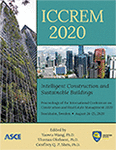International Conference on Construction and Real Estate Management 2020
Emotional Factors on Residential Well-Being in Densely Populated Cities
Publication: ICCREM 2020: Intelligent Construction and Sustainable Buildings
ABSTRACT
In densely populated cities, rapid urbanization has accelerated the development of the built environment, which may change residents’ lifestyles and have a great impact on their mental health. As pointed out by many researchers, the built environment is designed to make residents get more happiness, not just physically but also psychologically. Taking a case study in China, field visits were conducted to four small-scale communities in Shenzhen. By observing and conducting interviews with 47 respondents, the study aims to explore the practical problems and influential factors in the living environment and to understand perceptions of residents based on residential well-being. The study also investigates the relationship between the overall residential well-being and the positive affect, to further understand the effects of different emotional aspects on residential well-being, which is expected to provide a new direction for the future community design.
Get full access to this article
View all available purchase options and get full access to this chapter.
ACKNOWLEDGMENTS
Kindly thank all community staff and residents in the Haiwang Community of Shenzhen for their cooperation. We would like to thank The Hong Kong Polytechnic University and Harbin Institute of Technology for the support to carry out the study. We also specially thank the Eric C. Yim Endowed Professorship for the research support in the data analysis.
REFERENCES
Araya, R., Montgomery, A., Rojas, G., Fritsch, R., Solis, J., Signorelli, A. and Lewis, G. (2007). “Common mental disorders and the built environment in Santiago, Chile.” The British Journal of Psychiatry: The Journal of Mental Science, 190(07), 394-401.
Berg, M., Wendel-Vos, W., Poppel, M., Kemper, H., Mechelen, W. and Maas, J. (2015). “Health benefits of green spaces in the living environment: A systematic review of epidemiological studies.” Urban Forestry & Urban Greening, 14(4), 806-816.
Bond, L., Egan, M., Kearns, A. and Tannahill, C. (2013). “GoWell: The challenges of evaluating regeneration as a population health intervention.” Preventive Medicine, 57(6), 941-947.
Cacioppo, J.T., Gardner, W.L. and Berntson, G.G. (1999). “The affect system has parallel and integrative processing components: Form follows function.” Journal of Personality and Social Psychology, 76(12), 839-855.
Clark, L.A., Waston, D. and Leeka, J. (1989). “Diurnal variation in the positive affect.” Motivation and Emotion, 13(07), 205-234.
Diaz, L., and Rhodes, R. (2018) Job satisfaction: Influencing factors, gender differences and improvement strategies (Business issues, competition and entrepreneurship series), Nova Science, New York.
Diener, E. (2009) The science of well-being the collected works of Ed Diener, Springer Verlag, New York.
Fredrickson, B., and Seligman, Martin E. P. (2000). “Cultivating Positive Emotions to Optimize Health and Well-Being.” Prevention & Treatment, 3(1), 1a.
Gong, Y., Palmer, S., Gallacher, J., Marsden, T. and Fone, D. (2016). “A systematic review of the relationship between objective measurements of the urban environment and psychological distress.” Environment International, 96(C), 48-57.
Hino, A.A.F., Reis, R.S., Sarmiento, O.L., Parra, D.C. and Brownson, R.C. (2011). “The built environment and recreational physical activity among adults in Curitiba, Brazil.” Preventive Medicine, 52(6), 419-422.
Park, M., Kim, C., Ranabhat, C., Kim, C., Chang, S., Ahn, D. and Joo, Y. (2018). “Influence of community satisfaction with individual happiness: Comparative study in semi-urban and rural areas of Tikapur, Nepal.” Global Health Promotion, 25(3), 22-32.
Troped, P.J., Wilson, J.S., Matthews, C.E., Cromley, E.K. and Melly, S.J. (2010). “The Built Environment and Location-Based Physical Activity.” American Journal of Preventive Medicine, 38(4), 429-438.
Wei, X., Zou, G. and Siu, K.W.M. (2020). “Identification of Residential Well-Being Factors in Urban Community Design.” <https://doi.org/10.1007/978-3-030-20151-7_46> (Oct. 4, 2019).
Weich, S., Blanchard, M., Prince, M., Burton, E. and Sproston, K. (2002). “Mental health and the built environment: Cross-sectional survey of individual and contextual risk factors for depression.” The British Journal of Psychiatry: The Journal of Mental Science, 180(13), 428-33.
World Health Organization. (2017). “Depression and other common mental disorders: global health estimates.” <https://apps.who.int/iris/handle/10665/254610> (Oct. 9, 2019)
Yi, Y. and Nataraajan, R. (2018). “Customer satisfaction in Asia.” Psychology & Marketing, 35(6), 387-391.
Zhou, P., Grady, S. and Chen, G. (2017). “How the built environment affects change in older people’s physical activity: A mixed-methods approach using longitudinal health survey data in urban China.” Social Science & Medicine, 192(13), 74-84.
Information & Authors
Information
Published In
ICCREM 2020: Intelligent Construction and Sustainable Buildings
Pages: 632 - 638
Editors: Yaowu Wang, Ph.D., Harbin Institute of Technology, Thomas Olofsson, Ph.D., Luleå University of Technology, and Geoffrey Q. P. Shen, Ph.D., Hong Kong Polytechnic University
ISBN (Online): 978-0-7844-8323-7
Copyright
© 2020 American Society of Civil Engineers.
History
Published online: Oct 14, 2020
Published in print: Oct 14, 2020
Authors
Metrics & Citations
Metrics
Citations
Download citation
If you have the appropriate software installed, you can download article citation data to the citation manager of your choice. Simply select your manager software from the list below and click Download.
